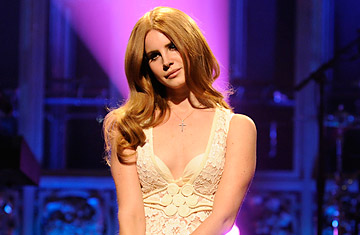
Lana del Rey
When Daniel Radcliffe introduced Saturday Night Live musical guest Lana Del Rey on Jan. 14, most viewers probably wondered who she was. An online starlet thanks to a couple of low-res YouTube videos, Del Rey has no chart hits, no album available and nothing in stores, save for a few magazine covers showcasing her early-'60s fashion sense and Mick Jagger--size lips. Such an unproven talent doesn't often appear on America's highest-profile stage for live music.
After she performed, the same viewers likely wondered how in the world she'd gotten there. Del Rey, 25, looked alternately dazed and terrified as she pouted through "Video Games" and "Blue Jeans," mangling lyrics into off-pitch strings of meaningless phonemes and occasionally making a wobbly 360-degree turn in her floor-length gown. As SNL debacles go, it wasn't quite Ashlee Simpson dancing a jig over a vocal track, but it was close.
Del Rey--whose album Born to Die arrives Jan. 31--is a case study in how the manufacturing of a pop phenomenon can go hugely right and terribly wrong at the same time. The official narrative is of a DIY success story: a singer-songwriter who once lived in a trailer park, she posted a homemade promo for "Video Games" on YouTube last August. Magically, the ecstatic press--and covers and remixes--rolled right in. She followed up with more hip-hop-inflected torch songs mining the same territory of cinematic sweep and outlaw mythology. She was booked to play The Ellen DeGeneres Show and Letterman. She signed a modeling contract. She even received a Brit Award nomination as an "international breakthrough artist."
The buzz seemed like Bieber fever for people who dig David Lynch. But on closer inspection, the swell of acclaim appears to have been carefully orchestrated--as it can be when you're backed by Interscope Records, home of Lady Gaga, Madonna and U2. In fact, Del Rey, ne Lizzy Grant, was signed to the label before she posted her videos. Though in interviews she has intimated a hardscrabble background, her father is a wealthy domain-name investor. The Lana Del Rey identity, she said, "came from a series of managers and lawyers over the last five years who wanted a name that they thought better fit the sound of the music." She's touted as a major new songwriting talent, but her album is co-written by veteran songsmiths. And Born to Die is not her debut: she briefly released an unremarkable singer-songwriter album a couple of years ago, then pulled it from circulation.
The problem is not that the Lana Del Rey character--a haunted Hollywood studio girl, an ingenue in the thrall of a bad, bad man--is a blatantly constructed facade. Pop would be nothing without invented personae, and Del Rey's is cleverer than most. It's not even that she has changed her look and sound so drastically since her days as Lizzy Grant. Tori Amos once fronted the synth-pop band Y Kant Tori Read; Katy Perry started her career with a Christian-rock album. Everyone's entitled to a false start or two.
